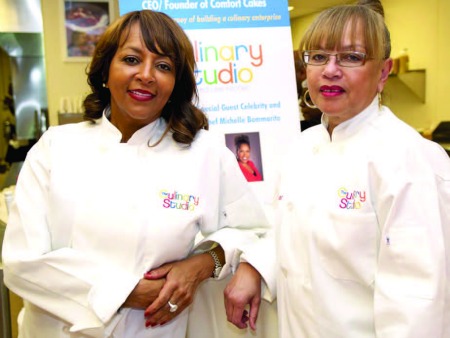
By Olga Hill
Jo Coleman and Cassandra Morrison opened their Southfield based business, The Culinary Studio, in 2011 after realizing there was a need for an environment for culinary professionals to mass produce their products without incurring the full expense of a full blown brick and mortar establishment.
Morrison, a personal chef who was behind the original concept, constantly found herself in search of a space to prepare meals for her clients. She was never able to find a space in her community designed to fit the demanding needs of her business.
Coleman, also having a passion for cooking, developed a healthy cooking initiative created to help fight obesity in the African American community, Healthy Eating Community (HEC), which she operated out of her home and desperately needed space to expand. The program focused on teaching African Americans how to prepare traditional comfort foods using healthier ingredients.
This business venture had been three years in the making. A successful trip to Kitchen Chicago fostered the confidence they needed to step out on faith.
“We faced these challenges and we knew that other people had similar challenges. We felt comfortable too because it’s such a unique business,” said Coleman.
For small catering companies or specialty-food startups, shared use commercial kitchens are a way for startup businesses to avoid excessive overhead and an opportunity for them to become competitive forces in the culinary arts industry. Shared commercial kitchen space has taken a time- tested concept and swapped out office space for kitchen space.
According to the National Business Incubation Association over, 50 kitchen incubators have opened across the United States and there are many more in the planning stages. These incubators are seen as valuable resources for small culinary business owners because they create a roadmap for navigating through the complex network of regulation, packaging and distribution laws.
“We are a great incubator and a foundation to building a legitimate business,” said Coleman.
Rani Bookvich, business owner and client of the Culinary Studio, says she knew her snack-size granola was marketable but had no clue how to start the process of obtaining a manufacturing license.
“Cassandra directed me throughout the whole process. I was able to obtain my license and because of the Culinary Studio was able to fulfill an order for Whole Foods for 16, 000 units,” she said.
Bookvich is the owner of Rani’s Nutrafoods, a company that was inspired by the birth of her son. Through her background in dietetics she realized she could increase the amount of breast milk her body generated by eating more oats. Having a disdain for oatmeal, she began baking granola. Her product is now in Kroger and Whole Foods stores.
The Culinary Studio celebrated its second anniversary of operation last week and foresees tremendous growth this year.
“The culinary kitchen is open 24 hours, 7 days a week. Our business model is to fill as many of those hours… we are hoping this year to double our client base,” said Coleman.
The culinary kitchen services include hosting private events, cooking classes and corporate team building cooking experiences.
For more information, visit www.myculinarystudio.com.